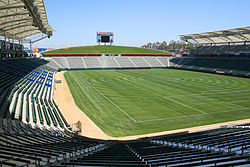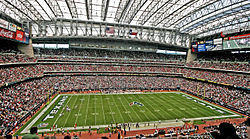| CONCACAF Championship | |
|---|---|
 2005 CONCACAF Gold Cup official logo | |
| Tournament details | |
| Host country | United States |
| Dates | July 6–24 |
| Teams | 12 (from 3 confederations) |
| Venue | 7 (in 7 host cities) |
| Final positions | |
| Champions | |
| Runners-up | |
| Tournament statistics | |
| Matches played | 25 |
| Goals scored | 73 (2.92 per match) |
| Attendance | 340,018 (13,601 per match) |
| Top scorer(s) | (3 goals each) |
| Best player | |
| Best goalkeeper | |
| Fair play award | |
← 2003 2007 → | |
The 2005 CONCACAF Gold Cup was the eighth edition of the Gold Cup, the soccer championship of North America, Central America and the Caribbean (CONCACAF). It was contested in the United States in July 2005. The United States emerged victorious in the final against an upstart Panama team led by tournament MVP Luis Tejada. After regulation and 30 minutes of extra time ended scoreless, the U.S. won 3–1 on penalties.
Contents
- Qualified teams
- Venues
- Squads
- Group stage
- Group A
- Group B
- Group C
- Ranking of third-placed teams
- Knockout stage
- Bracket
- Quarter-finals
- Semi-finals
- Final
- Statistics
- Goalscorers
- Awards
- Winners
- Individual awards
- References
For this edition, the format was switched from four groups of three teams each to the three groups of four teams. As a result, there was one more group stage game for each team, and the likelihood of teams advancing on a coin toss was much less. The top two teams from each group and the two best third-place teams would advance to the quarterfinals.
As usual for the Gold Cup, several of the top teams fielded less than their top squads, including guest teams Colombia and South Africa. Mexico and the United States were missing at least half their usual starters, and a few top name players on smaller nations (Paulo Wanchope and Amado Guevara, among others) also declined to participate. During the tournament, matches in Miami's Group A had to be postponed because of Hurricane Dennis.
This was the last edition of the tournament to have guest participants from other confederations until the 2021 CONCACAF Gold Cup.







